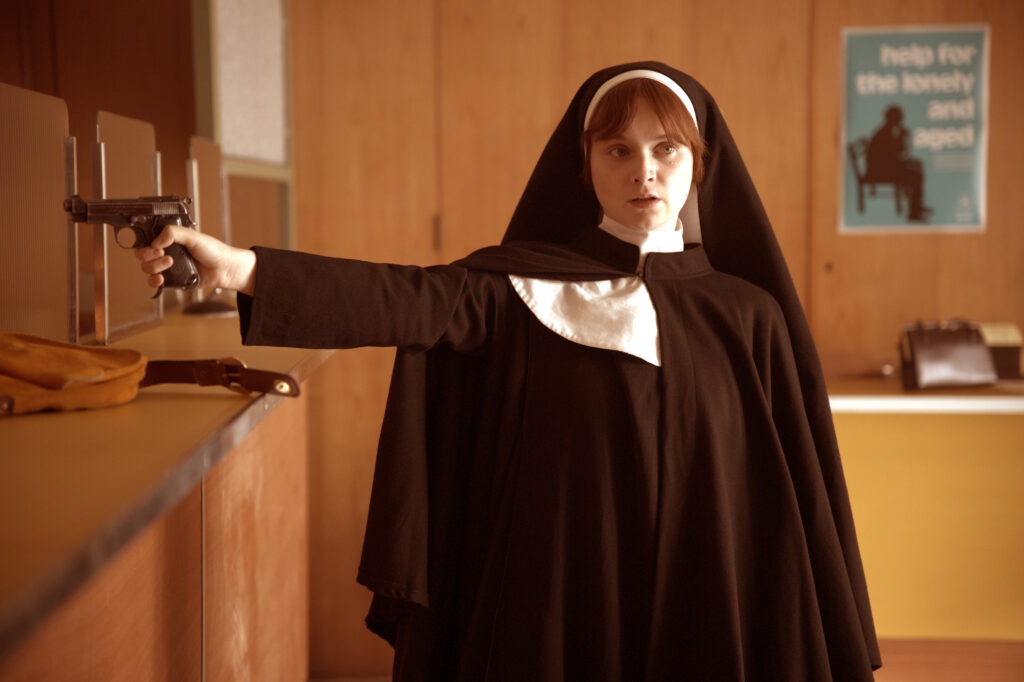‘Say Nothing’ Is a Luminous Look at One of Ireland’s Darkest Hours
The book — now a television series — is an arresting dispatch from empire and its discontents.

Available on Hulu by way of FX, “Say Nothing” is a luminous adaptation of the book of the same name written by Patrick Radden Keefe. Its subject is the Troubles in Northern Ireland, the decades of strife centered at Belfast that consumed the Emerald Isle between the 1960s and the Good Friday Agreement of 1998. Call it a war, a rebellion, an insurgency, or what you will — it was a brutal snarl of intimate violence over how the North was to be ruled.
Mr. Radden Keefe’s book is now adapted as a nine-episode series, directed by Mike Lennox (“Derry Girls”). Its center is a tragedy embedded within an era of them — the disappearance from a high-rise apartment, during the depth of the Troubles, of a widowed mother of 10, Jean McConville. She was taken by members of the Irish Republican Army, and her body would not be unearthed for decades.
“Say Nothing” tracks the leadership of the IRA through years of bloodshed. The “big lad,” or leader, is Gerry Adams (Josh Finan), who aged into something like political respectability by denying — astonishingly — that he was ever involved in the group. Then there are the Price sisters, Dolours (Lola Petticrew) and Marian (Hazel Doupe). Born of sterling republican stock, they declare their willingness to die for a united Ireland, and embark on a hunger strike to prove it.
The show’s early episodes are a riveting exploration of urban warfare. The setting is West Belfast, all alleyways and broken glass and dismal gray skies. It is 1970, and her majesty has sent General Frank Kitson (Rory Kinnear), a veteran of Britain’s anti-insurgency in Kenya. He would eventually rise to become her aide-de-camp general, but here is the portrait of a cold-blooded commander, intent on breaking IRA minds and bodies. He is Westminster’s fist.
Kitson’s forces, though, are fighting on foreign terrain. “Say Nothing” is attentive to how the struggle against the British unfolds in living rooms and kitchens, back doors and silent complicity. It is also intergenerational: grannies hide guns, and children serve as lookouts. There is the joy bred from desperate comradeship, but also fear, particularly of “touts,” or informants. The fate the IRA delivers them — suspected and real — is especially brutal.

The Price girls are electric, their beauty backlit by incandescent commitment to the cause. Dolours declares that she “would die for a united Ireland,” and their commitment propels them to rise in the ranks, eventually reporting to Adams directly. A scene where the sisters, in nuns’ habits, rob a bank captures the antic fun of it all, a bildungsroman written in bullets. Less light is the deepening complicity in what would come to be seen as war crimes.
The Prices persuade Adams to authorize a brazen mission: the bombing of the Old Bailey at London in 1973. Dolours commands a cadre of 11 IRA agents, all young comrades and crushes. Around 200 people were injured. The Prices were caught, and spent eight years in prison. They emerged as different people, to a different struggle. An episode that tracks their hunger strike in prison — the stuff of lore — is especially excruciating.
The last movement of “Say Nothing” slows down as its protagonists age. Adams transitions from commanding a guerrilla campaign to well-tailored suits and invitations to the White House. His old comrades — not only the Prices, but also his second in command, Brendan Hughes (Anthony Boyle), known as “The Dark” — see this as a betrayal of the cause for which they have suffered and made others suffer. The British are still there, and the status of Northern Ireland shapeshifts.
“Say Nothing” is told from the perspective of the diehards, and peace brings them a bitter unease. Their lives become less bright, the lines of good and evil blurrier. Dolours takes to the bottle and prescription medications, and Marian is still conspiring, deep into middle age, with “the lads” to attack British soldiers. She was only released from prison in 2013. One can’t help but sympathize with the warriors for whom there has never been a cease-fire.
The case of McConville is finally cracked, though other demons never come fully into the light. Dolours and Hughes accuse Adams of bearing the guilt for her abduction and murder, but the evidence is too cold and scattered to charge him. His refrain, “I have never been a member of the IRA,” is delivered with absurdist chutzpah. “Say Nothing” is an arresting dispatch from one of last century’s most charismatic and confounding conflicts.

